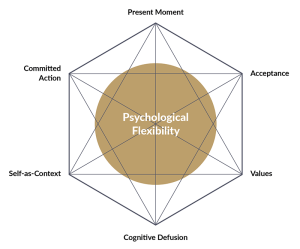What is Acceptance and Commitment Therapy in a nutshell?
In a nutshell, Acceptance and Commitment Therapy (otherwise called ACT) is about learning skills to unhook ourselves from unhelpful thoughts, feelings, memories, sensations, or learned behaviour patterns with compassion and then to choose deliberate actions which move us towards our values, goals and the person we want to be and how we want to live our lives.
It is a collaborative and compassion-based approach that easily integrates with other therapeutic approaches which may be also applicable and helpful for a certain person’s difficulties and goals.
What are the principles of Acceptance and Commitment Therapy (ACT)?
Acceptance and Commitment Therapy utilises 6 processes; Contact with the present moment, Acceptance, Defusion, Values, Committed Action, and Self-as context in order to foster and develop Psychological flexibility. Psychological flexibility allows us to…
- Do what matters
- Be present
- Open up
Image credit: positivepsychology.com
A little more on those 6 core components of Acceptance and Commitment Therapy (in no particular order) as these direct the types of skills learnt and developed;
- Contact with the present moment – so learning to in the here and now which is where we have the power to influence our state and circumstances
- Acceptance – opening ourselves up to our experiences, thoughts, feelings (this doesn’t mean we have to agree with them)
- Defusion – observing our thoughts, feelings, memories in such a way that they aren’t sweeping us up and controlling our actions
- Values – getting clear on what actually matters to us and the person we want to be
- Committed Action – Doing what it takes to have a meaningful, value driven life
- Self-as-context – engaging our observing self, the part of each of us that notices
Leading us to another common question about this approach…
What is Acceptance and Commitment Therapy used for?
Research supports the use of ACT with a wide range of clinical difficulties including but not limited to PTSD, depression, anxiety disorders, substance use, chronic shame and pain. It is transdiagnostic which allows it to be implemented across multiple difficulties that someone may be experiencing rather than seeking several separate mental health treatments.
Is acceptance and commitment therapy a form of CBT?
ACT or Acceptance and Commitment therapy has the same underlying premise as Cognitive Behaviour Therapy (CBT) that our thoughts influence our feelings and in turn our behaviours. How they differ though is their approach to their thoughts and feelings. From a CBT approach we learn to challenge, and reframe our thoughts, and develop strategies to manage emotions. From an ACT approach we acknowledge all thoughts and feelings, learn ways to distance ourselves enough from them to be in the position to take meaningful actions.
Both approaches are evidence-based approaches, it is about working with your clinician to find what works best for you. I often utilise the ACT approach as I have found it to be compassionate and validating of our own personal internal experience rather than getting into a fight with our thinking and feelings trying to make it fit into another’s predetermined expectation of what our internal experience should be, which can sometimes lead to invalidating ourselves and our very human experiences. For this reason, I have also found it to be a culturally safe approach when used by a culturally safe clinician.
Harris, R. (2021). Trauma-Focused ACT: A Practitioner’s Guide to Working with Mind, Body, and Emotion Using Acceptance and Commitment Therapy. New Harbinger Publications.
Harris, R. (2011). The happiness trap: Stop struggling, start living. Exisle Publishing
Hayes, S. C., Luoma, J. B., Bond, F. W., Masuda, A., & Lillis, J. (2006). Acceptance and commitment therapy: Model, processes and outcomes. Behaviour Research and Therapy, 44, 1-25. doi: 10.1016/j.brat.2005.06.006
Author: Samantha Sheppard, B Psych (Hons).
Samantha is a registered psychologist with experience working with children and adolescents (and their families), young adults and adults. Samantha empowers others with their mental health using a non-judgemental, compassionate approach, and particularly resonates with the social and emotional wellbeing framework.
To make an appointment with Samantha Sheppard try Online Booking. Alternatively, you can call M1 Psychology Loganholme on (07) 3067 9129.
